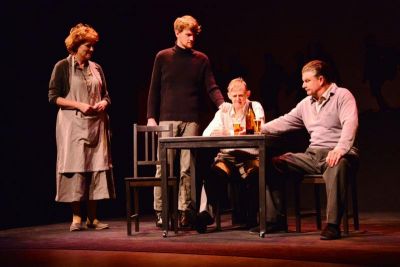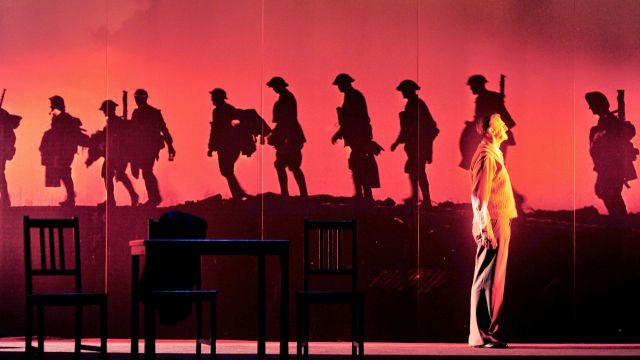The One Day of the Year: Vale Alan Seymour
It was a moving coincidence that HIT’s touring production of Alan Seymour’s iconic Australian play should open one day after the sad death of its playwright. But this is a really sensitive and charming production. As it continues its national tour it will remain a fitting tribute to Seymour, his courage and the iconic characters he created.
The play looks at changing traditions and values in post World War II Australian society. The fact that Seymour used the differing attitudes to Anzac Day celebrations to exemplify the theme was controversial when it was first staged in 1962 – but time, history and Australia’s ongoing commitment to other conflicts have authenticated and softened that theme, so the play has become both a symbol of its time and a reminder of the nature of change.
HIT and director Denis More saw the revival of the play as “entirely appropriate … in the context of the 100th Anniversary of Gallipoli” and their evocative and perceptive production is a subtle mixture of commemoration and social and theatrical history.
The silhouetted figures in Frank Hurley’s famous photograph ‘Soldiers Walking to the Front’ stand high across the back of the stage in a red glow and the haunting notes of Benjamin Britten’s War Requiem conjure an atmosphere of melancholy and remembrance.
 The scene that plays before it in Dot Cook’s inner city home is far from melancholic. Her returned servicemen husband, Alf, is sounding off about the way he is treated by those riding his lift. His old mate Wacka, veteran of both World Wars, listens amiably. It’s April and Alf is looking forward to Anzac Day – the ‘one day of the year’ when he feels he is ‘someone’. Meanwhile their university student son Hughie and his ‘north shore’ girlfriend are preparing to photograph the seedier side of Anzac Day for a university publication.
The scene that plays before it in Dot Cook’s inner city home is far from melancholic. Her returned servicemen husband, Alf, is sounding off about the way he is treated by those riding his lift. His old mate Wacka, veteran of both World Wars, listens amiably. It’s April and Alf is looking forward to Anzac Day – the ‘one day of the year’ when he feels he is ‘someone’. Meanwhile their university student son Hughie and his ‘north shore’ girlfriend are preparing to photograph the seedier side of Anzac Day for a university publication.
The situation is fraught with multiple tensions, which Dot tries desperately to manage. It erupts on Anzac Day when Wacka can’t march and Hughie refuses to go to the dawn service. Alf storms out on his own and when he comes home drunk but happy, full of tales of his mates and their drinking sprees, Hughie lashes out with some harsh criticism that seals the rift between parents and son.
Peter Hardy is convincingly believable as Alf. He paces, rants and lays down the law. As he does so, however, he demands both the sympathy and respect of the audience – because Hardy shows beneath his words the hidden, stinging hurt of damaged pride and thwarted ambition. Hardy’s Alf typifies many of the men of my father’s generation, returned soldiers who subsisted valiantly in poorly paid jobs with little future. It is a commanding performance.
Christine Keogh plays Dot with similar empathy for the role. She depicts the strength and reliability demanded of this woman as wife, mother and friend – a strength that is contained and restrained. She loves, but never mentions the word. To do so would betray the vulnerability that she dare not show. Keogh uses stance and gesture and a watchful intensity that accentuates these underlying aspects of the character.
 The familiar figure of Don Bridges is a perfect choice for Wacka. His wealth of experience brings depth and compassion to the role as he listens, reacts silently or shuffles off for another bottle. When he does speak, everyone listens. His different relationships with Alf, Dot and Hughie are clear and defined. It was a pleasure to see him bringing this old digger to life on the live stage.
The familiar figure of Don Bridges is a perfect choice for Wacka. His wealth of experience brings depth and compassion to the role as he listens, reacts silently or shuffles off for another bottle. When he does speak, everyone listens. His different relationships with Alf, Dot and Hughie are clear and defined. It was a pleasure to see him bringing this old digger to life on the live stage.
Luke Clayson is suitably gullible and defensive as Hughie. He shows the internal struggle between where he is, and where he wants to go, clearly and engagingly. It’s there not only in his words, but also in his tense shoulders and desperate eyes – a telling contrast to the self confidence of his girlfriend, Jan Castle, played with great care and thought by Olivia Solomons. Where this character is often played unsympathetically, Solomons finds compassion as well as self-assurance in the character. Her Jan learns and understands rather than feeling superior.
It is often with trepidation that one goes to see a play seen many times before. This production restores faith in what thoughtful and creative direction, fine acting and excellent timing bring to a well-written if oft’ produced play. Watch for the moment when Don Bridges brings Wacka slowly to attention as the notes of the Last Post take him back to his youth. And wait for the change in lighting at the end of the play that sets two generations, present and future, in a stunning freeze in front of the past.
Carol Wimmer
Photographer: Kirsty Galloway McLean
Subscribe to our E-Newsletter, buy our latest print edition or find a Performing Arts book at Book Nook.

